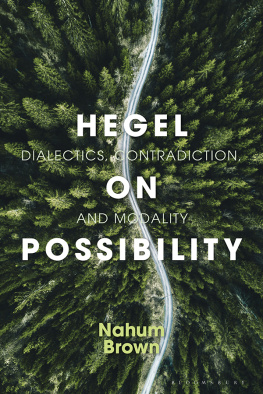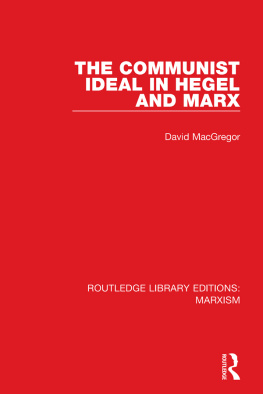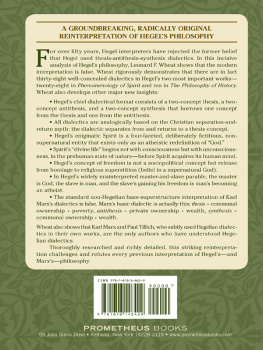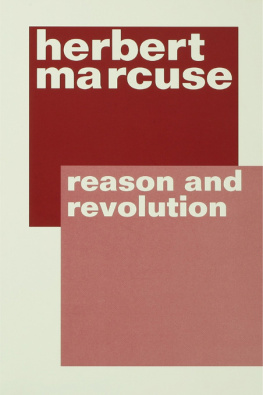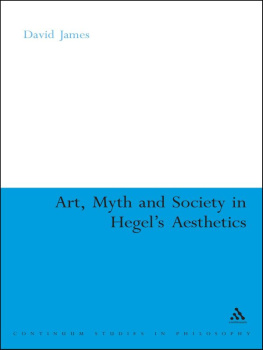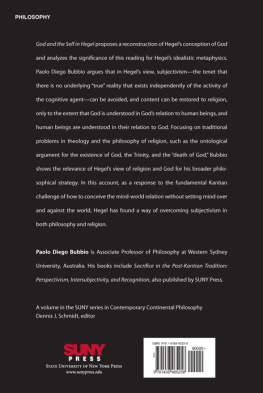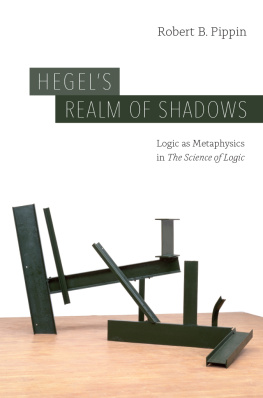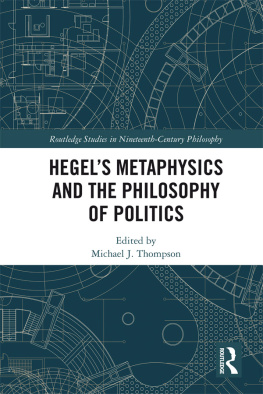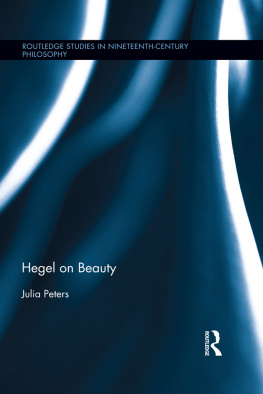Hegel on Possibility
Also Available at Bloomsbury
The Architecture of Freedom: Hegel, Subjectivity, and the Postcolonial State, Hassanaly Ladha
From Marx to Hegel and Back: Capitalism, Critique, and Utopia, ed. Victoria Fareld and Hannes Kuch
Hegel, Logic and Speculation, ed. Paolo Diego Bubbio, Alessandro De Cesaris, Maurizio Pagano, and Hager Weslati
Hegel and Resistance: History, Politics and Dialectics, ed. Bart Zantvoort and Rebecca Comay
Hegel on Possibility
Dialectics, Contradiction, and Modality
Nahum Brown

This book could not have been written without the outstanding support of friends, family, colleagues, mentors, and students, as well as generous institutional support. Many of the ideas in this book were first presented at conferences at the University of Guelph (Canada), the Chinese University of Hong Kong (CUHK), the University of Regina (Canada), Tallinn University (Estonia), National Chengchi University (Taiwan), Trent University (Canada), the National University of Singapore (NUS), the Hong Kong University of Science and Technology (HKUST), Marlboro College (USA), the University of Macau (UMAC), and National Cheng Kung University (Taiwan), in conjunction with associations including the Society for Phenomenology and Existential Philosophy (SPEP), the International Association of Philosophy and Literature (IAPL), the Ontario Hegel Organization (OHO), and the International Philosophical Seminar (IPS). I would like to thank the blind reviewers of Bloomsbury Academic Publisher, who offered insightful advice about how to revise this book. I would also like to thank Jay Lampert, Tom Rockmore, John Russon, Kelly Coble, Peter Cheyne, Edward S. Casey, and John W. Burbidge for commenting on earlier drafts. I had invaluable conversations about Hegel and related themes with a lot of amazing people, including Jerry Levy, Laura Stevenson, Ross Benjamin, Jonathan Rattner, Casey Ford, Suzanne McCullagh, Joe Arel, John Lundy, Sasa Stankovic, Mario Wenning, Stefan Deines, William Franke, Batrice Marchet, Greg Moss, Saulius Geniusas, Eric Nelson, David Chai, Shengqing Wu, Lucas Scripter, James Batcho, John Giordano, Shang-wen Wang, Michael Clark, Kai Marchal, Hans-Georg Moeller, Ting-mien Lee, Alexei Procyshyn, Luis Cordeiro Rodrigues, Tim Beaumont, Suzanne Beiweis, Itay Shani, and Billy Wheeler. I am grateful to the University of Macau, the Hong Kong University of Science and Technology, and Sun-yat Sen University for granting research time and resources. Special thanks to my grandmother Hilary Michaud for her tremendous emotional support over these years. I would also like to acknowledge permission to : Transcendent and Immanent Conceptions of Perfection in Leibniz and Hegel in Transcendence, Immanence, and Intercultural Philosophy, edited by Nahum Brown and William Franke, Palgrave, 2016.
| CPR | Kant, Immanuel, Critique of Pure Reason, trans. Guyer, Paul and Wood, Allen W. (Cambridge: Cambridge University Press, 1998). |
| CWA | Aristotle, The Complete Works of Aristotle, 2 vols. (Princeton: Princeton University Press, 1984). |
| DM | Leibniz, G.W., Discourse on Metaphysics and Other Writing, ed. Loptson, Peter (Toronto: Broadview Editions, 2012). |
| EL | Hegel, G.F.W., The Encyclopaedia Logic, trans. Geraets, T.F., Suchting, W.A., and Harris, H.S. (Indianapolis: Hackett Publishing, 1991). |
| FLB | Deleuze, Gilles, The Fold: Leibniz and the Baroque, trans. Conley, Tom (Minneapolis: University of Minnesota Press, 1993). |
| LS | Deleuze, Gilles, The Logic of Sense, trans. Lester, Mark (New York: Columbia University Press, 1990). |
| PE | Leibniz, G.W., Philosophical Essays, trans. Garber, Daniel and Ariew, Roger (Indianapolis: Hackett, 1989). |
| PS | Hegel, G.F.W., Phenomenology of Spirit, trans. Miller, A.V. (Oxford: Oxford University Press, 1977). |
| SL | Hegel, G.F.W., The Science of Logic, trans. di Giovanni, George (Cambridge: Cambridge University Press, 2010). |
| TH | Leibniz, G.W., Theodicy, trans. Huggard, E.M. (Charleston: BiblioBazaar, 2007). |
| WL | Hegel, G.F.W., Werke in zwanzig Bnden, 5: Wissenschaft der Logik I (Frankfurt am Main: Suhrkamp Verlag, 1969). |
| WLII | Hegel, G.F.W., Werke in zwanzig Bnden, 6: Wissenschaft der Logik II (Frankfurt am Main: Suhrkamp Verlag, 1969). |
This book explores Hegels theory of possibility in the Science of Logic, and his related conception of contradiction, by examining Hegels solution to the problem of what I call modal indeterminacy. The problem of modal indeterminacy comes from the recognition that every possibility cannot be said to exist in actuality without some form of qualification, either by distinguishing existence in the concept actuality from existence in the concept possibility or by separating the multiplicity of possible outcomes through the conceptual scaffolding of worlds, typically by separating this actual world from a higher or lower world that transcends it, or by arguing that there are multiple possible worlds that extend beyond this one. Most traditions in the West wrestle to find solutions for how to acknowledge the existence of possibility while avoiding the absurdity and meaninglessness that would result from the total existence in actuality of every possibility whatsoever.
The concept of possibility inherently contains negativity, in the sense that what is possible both can be and can not be. If it is possible to walk, it is also possible not to walk. To claim that all possibilities exist in actuality without further qualification is to involve oneself in contradiction, which leads in turn to a jumbled field of meaningless indiscernibles, and to vague paradoxes verging on the formless. This problem haunts Aristotles famous account of modal reality in book Theta (book 9) of the Metaphysics, and his related account of the indeterminacy of contradiction in book Gamma (book 4). The problem of modal indeterminacy haunts Leibniz as well, who warns against the absolute void, which is what he thinks would result if God were to have actualized every possible world rather than lifting our actual world above the others. This is the same problem that Deleuze invokes when he asks, in relation to Leibniz, why cannot all incompossible worlds come into existence along with the actual world? If every possibility exists in actuality, without qualifying the priority of actuality over possibility, or in some way separating the possible from the actual, we end up with an absurd, imageless world of chaos verging on nihilism. Just as meaning requires determinate negation in the form of a contrast of something with another, the claim every possibility exists requires some form of qualification.
The most direct and, arguably, most naive response to modal indeterminacy comes from the followers of the Megarian School of Actualism, who claim outright that unactualized potentiality does not exist. The Megarians believe that an activity exists only when it is actual. They attempt to avoid a set of thorny issues that form when we concede ontological status to anything other than direct, ostensible actuality. The Megarians motivation lies in recognizing that, even if we do not go so far as to conclude that every potentiality exists, but only so far as to say some unactualized potentialities exist, we run into the danger of complicating the concept of existence either by having to concede that the category existence is larger than the category actuality or by expanding our conception of actuality to include, in a paradoxical way, our conception of unactualized potentiality. Because they worry that the existence of potentiality causes a complication in terms of its relation to actuality, with the danger of finding oneself unable to establish a clear distinction between actuality and potentiality verging on modal indeterminacy, the Megarians avoid the entire problem by dismissing the existence of potentiality outright.
Next page
